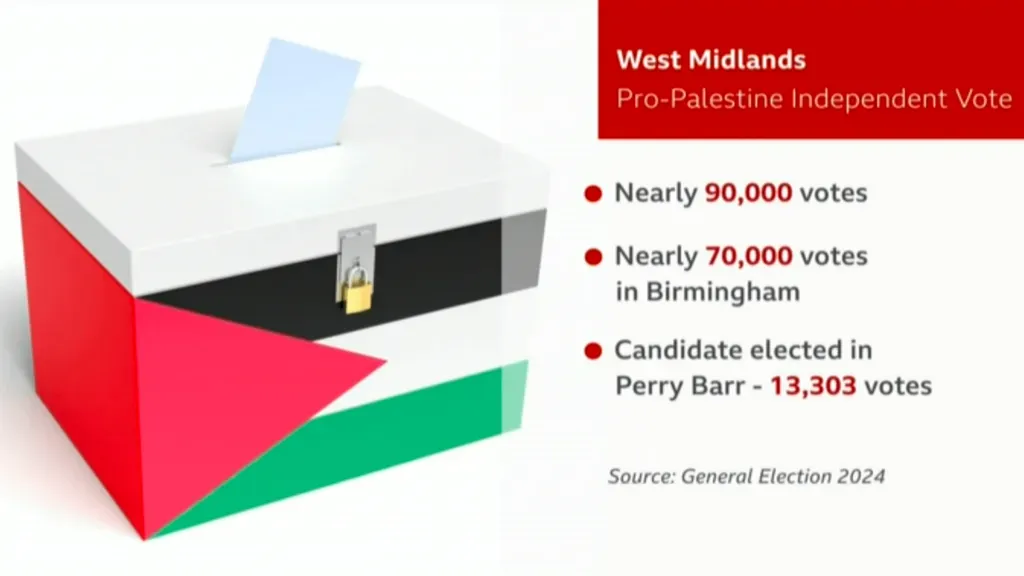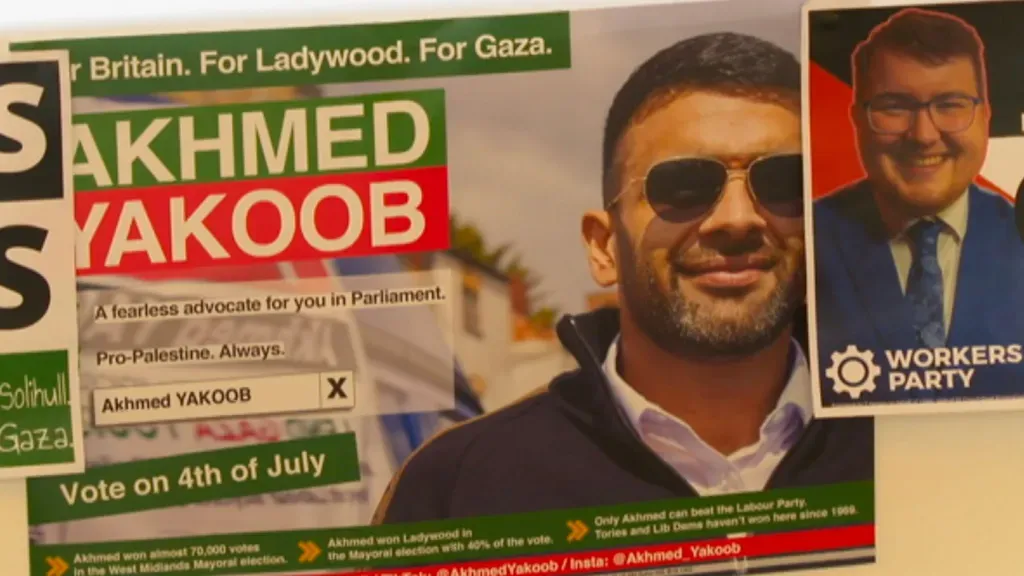In an unexpected twist during the latest general election, Birmingham, known for its substantial Labour support, witnessed a dramatic shift as independent candidates surged to prominence. This transformation has sparked intense discussions about the factors driving Muslims in Birmingham to abandon Labour, leading to a political upheaval in the city.
The Election Night Drama
What was anticipated to be a standard election declaration event turned into a high-stakes drama. The scene at Birmingham’s International Convention Centre (ICC) was far from ordinary. There were chants of “shame on you,” visible police presence, and even threats to remove members of the public. The city, which had long been a bastion of Labour support, saw its strongholds eroded by the rise of independent candidates.
Labour, cruising to a national victory, faced unexpected setbacks in Birmingham. Major Labour majorities were not only reduced but also overturned in key constituencies. The discontent was palpable, with the Labour MP for Yardley, Jess Phillips, describing the campaign as “gruesome.”
The Rise of Independent Candidates
Ayoub Khan emerged as the standout winner among independents, achieving a remarkable victory by overturning a 22,000-vote Labour majority to become the MP for Perry Barr. Khan attributed his success to a mix of factors, with the situation in Gaza being a significant one. However, he also highlighted local issues, such as homelessness, fly-tipping, and anti-social behavior, as key contributors to his victory.

Khan’s success was not an isolated event. Other independent and Workers Party candidates capitalized on growing frustrations within the community. Despite the national focus on Gaza, local grievances played a substantial role in the election results.
Community Frustration and Neglect
A common theme among voters in Birmingham’s ethnically diverse areas with large Muslim populations was a sense of being neglected. The city has been governed by Labour MPs and a Labour-led council for many years. Yet, issues such as rising council tax, service cuts, and unfulfilled promises have led to growing frustration.
Perry Barr, for instance, remains a visual testament to perceived neglect. Land around the railway station remains undeveloped, and new apartments, part of a legacy project from the 2022 Commonwealth Games, stand empty. Local residents, like Roshan Dass, the postmaster of Perry Barr, voiced their dissatisfaction. Dass pointed to issues like shoplifting, drug dealing, and a general decline in the area’s condition over the years.
The Role of Gaza in the Election
While the Gaza situation undeniably influenced the election, it was not the sole factor. Independent candidates tapped into a broader sense of disenfranchisement among local communities. Many felt that despite having Labour representation for decades, their issues were not adequately addressed.
Jody McIntyre, who narrowly lost to Jess Phillips in Birmingham Yardley, criticized both Labour and Conservative parties for failing to represent local communities effectively. He described them as “two sides of the same coin” and argued that Labour’s performance, particularly at the local level, was lacking.

Claims of Intimidation and Abuse
The campaign period was marked by claims of intimidation and harassment. Both Jess Phillips and Khalid Mahmood, the outgoing Labour MP for Perry Barr, reported incidents to the police, including slashed tyres and polling station intimidation. West Midlands Police acknowledged these reports and were investigating the incidents, though no arrests or charges were made.

Both Ayoub Khan and Jody McIntyre denied any misconduct by their campaigners and condemned any form of criminal behavior. McIntyre also reported being targeted with online abuse related to his disability.
Looking Forward
As Birmingham approaches the next local council elections, the impact of the recent general election remains significant. The rise of alternative candidates reflects a shift in the political landscape, driven by a mix of local grievances and broader issues.
The changing political dynamics in Birmingham suggest that the traditional Labour stronghold is facing new challenges. The community’s dissatisfaction with the status quo and the perceived neglect of important local issues are likely to continue influencing the city’s political landscape in the years to come.
FAQ
1. Why did independent candidates gain so much traction in Birmingham during the recent general election?
Independent candidates gained traction due to a combination of factors, including local issues like homelessness, fly-tipping, and anti-social behavior, as well as broader concerns about the Gaza situation. The sense of neglect and under-representation by long-standing Labour representatives also played a crucial role.
2. What were some specific issues that contributed to the dissatisfaction with Labour in Birmingham?
Specific issues included rising council tax, cuts in services, and visible under-performance in local development projects. Areas like Perry Barr showed signs of neglect, with undeveloped land and empty apartments contributing to the frustration.
3. How did the situation in Gaza influence the election results in Birmingham?
The situation in Gaza was a significant factor in the election, with many voters aligning with candidates who voiced strong support for the Palestinian cause. However, this was combined with local grievances, making it a multifaceted issue.
4. What claims of intimidation were reported during the election campaign?
Reports included slashed tyres, intimidation at polling stations, and general harassment. Both Jess Phillips and Khalid Mahmood made complaints to the police regarding these issues.
5. How are the recent changes in Birmingham’s political landscape expected to impact future elections?
The recent changes indicate a shift in Birmingham’s political dynamics, with independent candidates gaining influence. This could lead to a more competitive political environment in future local council elections, reflecting ongoing dissatisfaction with traditional parties.


